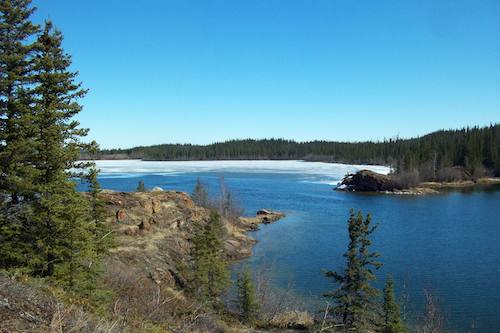From July 24 to August 4, young members of the Dene First Nation of Canada will embark on an exploration through one of Canada's most pristine and sacred areas with The Nature Conservancy's lead scientist, Sanjayan. They'll canoe along the Thelon River, ending in North America's largest and most remote wildlife refuge, the Thelon Game Sanctuary. The region is facing potentially devastating resource extraction threats and the youth attending the trip will be responsible for many important decisions in the future.

(Image: Great Slave Lake near Lutsel K'e. Image credit: Mike Palmer)
It is a place ruled by the biggest and smallest -- the grizzly and the mosquito -- and by the extremes of sub-arctic seasons. In the middle of it is the Thelon, the largest and most remote game sanctuary in North America, which almost no one has heard of.
Throw a dart at the map of the continent and aim for an area as far away from any city, town, village, road or airport, and chances are you will hit a region in Canada along the border of two territories; Nunavut and the Northwest Territories, just south of the Arctic Circle.
It's tundra country packed with shrub, grass and sedge, skating on a bed of ice that liquefies during the short summers of perpetual days. Herds of migratory caribou, musk ox and moose browse the plant life and are in turn shadowed by wolves, foxes and bears. Migratory songbirds and waterfowl, lured by the sheer biomass of insects, arrive to breed en-masse.
The Thelon River flows northwards for a while through this land, and with it takes the Boreal Forest boundary on a 200-km detour, deep into the barren tundra. This intrusion of forest acts as a magnet for wildlife. And as an important hunting, fishing and gathering ground for the Dene (pronounced "DEN-ay" by English speakers) First Nations.
In an expedition of cultural and ecological rediscovery, my friends and colleagues from The Nature Conservancy's Canada Program and I will explore the upper Thelon River watershed, traversing a couple of hundred kilometers of river by canoe and foot. We will not go alone into this sacred land. What makes this expedition so special is that we will be in the company of a half dozen youth (teenagers and twenty-somethings) along with a couple of local leaders from the First Nation village of Lutsel K'e.
We plan to be dropped off by charter planes this weekend, somewhere near the almost pedestrian sounding Jim Lake. Along with our canoes, satellite phones, solar panels, laptops, cameras, beans, rice, coffee, fishing rods, rifles and, crucially, bug suits. Maybe a hundred pounds per person.
From there we will head north on the Thelon River, covering 10 to 20 km per day by canoe where possible, portaging when we need to, and ending up within Thelon Game Sanctuary -- a sanctuary more than twice the size of Yellowstone, Glacier and the Serengeti parks combined!
For the Akaitcho Dene, the upper Thelon River is "the place where God began." According to legend, we will be canoeing through the area where their creator placed them on Earth.
Sparsely populated, today few make it into the Thelon. Distances are simply too far, modern vehicles too expensive and unreliable. For the Dene youth, faced with the pressures of a western world, the ties that bind the people and their way of life to the land are even more tenuous. Every impending mine, road and dam construction threatens to sever these connections.
As my friend Dr. Richard Jeo (The Nature Conservancy's Canada Program Director, and expedition attendee) said to me today, "We are interested in learning and conservation, and they are interested in securing a way of life -- both are part of the same."
Our hope is that this expedition will build amongst this cohort of youth a better understanding of their land and wildlife, and a desire to be a voice for conserving and stewarding a place we may call wilderness but they see as home.
We will be gone for about two weeks with nothing but what we bring, and what we can borrow from the land, to get us by.
We expect the planes to return to pick us up.
Follow their journey on Twitter and Cool Green Science.